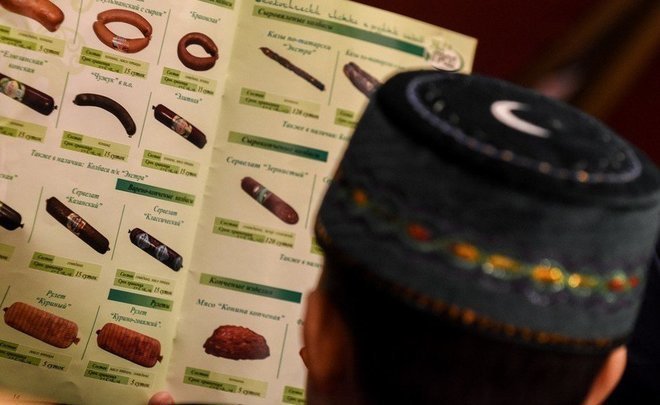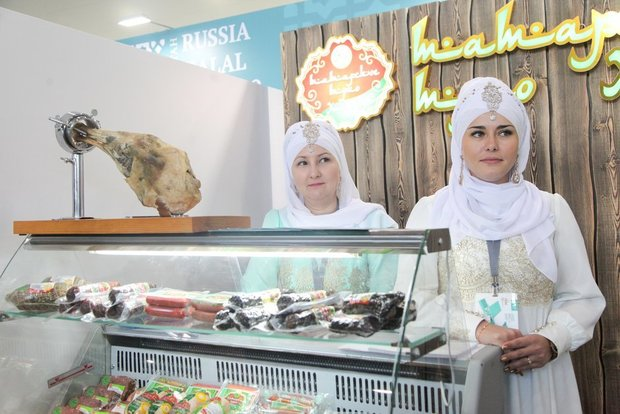‘Any guy can issue a Halal certificate today’
The head of the Committee of the Tatarstan Muslim Religious Directorate about Halal counterfeit, illegal use of the seal and certification issues

The turnover of Halal products has been $2 trillion in the world this year, this figure is forecasted to rise to 3 trillion by 2030. In Russia, the demand for the products increases by some 10-20% a year. At the same time, it is hard to provide the general number of goods made in our country because several agencies at once deal with Halal certification. But the problem is that the certificate issuance has turned into a profitable business for secular organisations that don’t care about following Sharia norms. The Competence Centre for Halal Products and Services that will start operating from next January is to put everything in order in this sphere. The Halal Standard Committee of the Tatarstan Muslim Religious Directorate that has received about 200 enterprises this year to get a certificate but less than a quarter has been authorised told Realnoe Vremya more about the activity of the centre and problems with counterfeit.
High demand leads to counterfeit
The Halal Standard Committee of the Tatarstan Muslim Religious Directorate has issued more than 40 new certificates in 2022 — certificates of registration as a legal entity. About 200 enterprises applied for the certificate but they haven’t been authorised for various reasons, said Chairman of the Halal Standard Committee of the Tatarstan Muslim Religious Directorate Hazrat Abbas Shlyaposhnikov:
“These figures illustrate the development of the Halal industry both in Tatarstan and Russia in general. All enterprises are carefully examined. Halal products are in high demand not only because of the religious aspect, it has a number of other advantages. First of all, the quality. This attracts different clients. An enterprise is subjected to another inspection when going through stages of the voluntary authorisation system. It can be considered to have been examined twice. People understand it and, in fact, focus on it.
When examining producers, specialists of the committee do not let products with GMOs and “various ingredients contradicting the norms of Islam and harming the organism.” However, there is the other side of the coin in the authorisation issue:
“Unfortunately, we have to claim that many companies use the Halal seal simply as a marketing stunt. There are counterfeits, their number is big. Enterprises try very hard and make up how to name their products to identify their as Halal — oriental, Muslim, pork-free, etc. This is why it is always necessary to pay attention to the Halal seal and the agency that issued it because non-religious authorities have recently started to issue it. It is yet to be seen if there is control there, we can only hope for God,” noted Shlyaposhnikov noted.
Abbas Shlyaposhnikov: “Unfortunately, we have to claim that many companies use the Halal seal simply as a marketing stunt”
“Halal” lottery
There are 400 cafes in Kazan that are considered Halal. There is about a thousand across the republic.
“Many cafes and food and drink venues don’t have a confirmation of a competent agency that their products are Halal. Many of them illegally use the Committee’s Halal seal, while some establishments and their owners don’t have the knowledge and idea of the Halal sphere. Nobody has examined them for their correspondence and we have to hope for their honesty. For instance, let’s take shawarma. Many think that Halal meat is used when preparing it, and the finished dish is completely Halal. This isn’t true. There are some other ingredients, food additives. For instance, ketchup can contain carmine, mayonnaise can have animal emulsifiers, L-cysteine is added to bread. It is necessary to pay attention even to the brush that is used to grease the bread with sauce. It is often made of pig bristle,” Hazrat Abbas warns.
The authorisation should be considered holistically, he stresses. At the same time, according to him, there have appeared new “secular” agencies issuing Halal certificates:
“They don’t refer to any Muslim religious organisation, they don’t have Sharia experts but issue Halal certificates and some of them have their own registered seals. A lot of products of this kind have already flooded the Russian market.
In fact, he says, “any guy can issue a certificate today.”
A centre calling upon order
The Competence Centre for Halal Products and Services that will start operating from January 2023. The Halal Standard Committee considers that this centre can unite the organisations authorised to issue Halal certificates in a certain system.
“We actively cooperate with all agencies issuing Halal certificates in Russia, we have signed agreements and memorandums on the recognition of certificates with many of them. We advocate the development of the Halal industry, moreover, if this comes from public agencies. We support the undertaking of the creation of the Competence Centre for Halal Products and Services and hope for fruitful cooperation. Marat Nizamov who once chaired the Halal Standard Committee and then was an adviser leads this organisation. He has big professional experience, he was a vice chairman of the Halal Products and Services Committee No. 704 at the Federal Agency on Technical Regulation and Metrology, he developed this standard himself,” Shlyaposhnikov noted.

Kazan is Russia’s Halal capital
Tatarstan is a pioneer in the production of Halal goods like it happened to the introduction of the voluntary authorisation system.
“Tatarstan President Rustam Minnikhanov ordered to develop a Halal Lifestyle programme and it is actively becoming a reality. It includes all aspects of a human’s life from the perspective of a Halal lifestyle. A Halal cluster is when services following Muslim traditions actively develop besides Halal products. Halal banking services are available now, a hotel and campsite complex is developing. More restaurants and cafes are introducing Halal menus or completely switch to this sphere. To be named a capital Kazan’s Muslim infrastructure must correspond to it. Halal is about lifestyle, not only food. We are glad to say that there has been a breakthrough in this area in the last few years,” the chairman of the committee thinks.
Sabantuy without Halal products
This year guests of Sabantuy festival in Kazan complained they couldn’t find Halal foods on the spot, particularly shashlyk, pilaf or other dishes that were available to all other visitors. A similar deficit has been seen at other events too. According to Hazrat Abbas, the problem can be solved only together. To fix the situation, any agency needs feedback from the population. If there is a complaint, there is a solution.
“This issue is precisely about the development of the city’s Muslim infrastructure. A dialogue is being actively held now with the Executive Committee, there is an understanding. I think the decision is up to the entrepreneurs themselves, if they are ready to certify a cafe, examine them for their correspondence to the Halal standard. It is necessary to attract those cafes that have already been authorised. This issue is being addressed. But here it is necessary to keep in mind that the problem will be solved only if people speak about it. If you haven’t found a Halal food venue and left the festival hungry, speak out,” the chairman of the committee stressed.
Tatarstan Halal products abroad
Besides the domestic market, Tatarstan products become popular abroad too. The export potential has grown in 2022 — another enterprise has entered a Near Eastern market. The famous Russian pasta and pastry producer Makfa has launched sales of its products in Saudi Arabia. 13 enterprises of the Committee already export their products. This year, the Committee started to prepare for authorisation in a national authorisation system. A package of documents required for authorisation, infrastructure are created, experts are trained.
Nowadays the management of the committee is set to be authorised as a Halal certification agency in the national authorisation system and in foreign authorisation organisations GAC (GCC), EIAC (UAE), HAC (the Turkish Republic), MUI (Indonesia).
Representatives of the biggest authorisation agency FAMBRAS HALAL visited Tatarstan in December. The products authorised by them are supplied to 185 countries of the world, including to Russia, it is authorised in those countries demanding a certificate of origin from the agency.
Scientifically proven Halal standard
This year the Halal Standard Committee has started to gradually cooperate with the scientific community of the republic and Russia. Particularly there have been signed agreements with Kazan National Research Technological University, Kazan State Medical University, Kazan Veterinary Medicine Academy.
“We create a Green League with leading universities of the republic to make the Halal industry more popular in the scientific environment. For instance, we plan to create a system of Halal medicines. For this purpose, we have made a list of 200 most popular medicines, while scientists of the medical university identified their accurate composition and altogether we have found their analogues following Muslim canons. Representatives of Kazan National Research Technological University provide us with explanations about different chemical additives, all kinds of E ingredients, examine their components, while our experts compare this knowledge with Sharia norms and then make a decision whether to issue a certificate to the producers of such products or not. By the way, harmful additives are mostly in confectioneries, these are the hardest products to authorise. Kazan State Veterinary Medicine Academy is our third partner. Here specialists examine the composition of food for poultry, cattle. We need this to make the correct decision whether to issue a certificate or not,” Shlyaposhnikov explained.
Online Halal standard
A special online app will be launched in 2023 any person can use and find out if a product follows Sharia lowas. Also, there has been signed an agreement with 2GIS company according to which the map will have pins of halal cafes and prayer rooms.
“2022 was announced the Year of Digitalisation by our president, the republic is developing the IT sphere in leaps and bounds, huge attention is paid to this. The Tatarstan Muslim Religious Directorate doesn’t stay on the sidelines and makes its contribution to the development of the IT industry. Interactive programmes of directories for cafes, examination of ingredients and food additives and prayer rooms in Tatarstan in an app are already developed,
Housewarming party
In 2023, the Halal Standard Committee will move to a separate office building.
“With the blessing of Tatarstan Mufti Hazrat Kamil Samigullin, we were allocated 320 square metres at Al Iman mosque. A Halal co-working space will also be created for Muslim IT specialists,” the head of the committee explained.